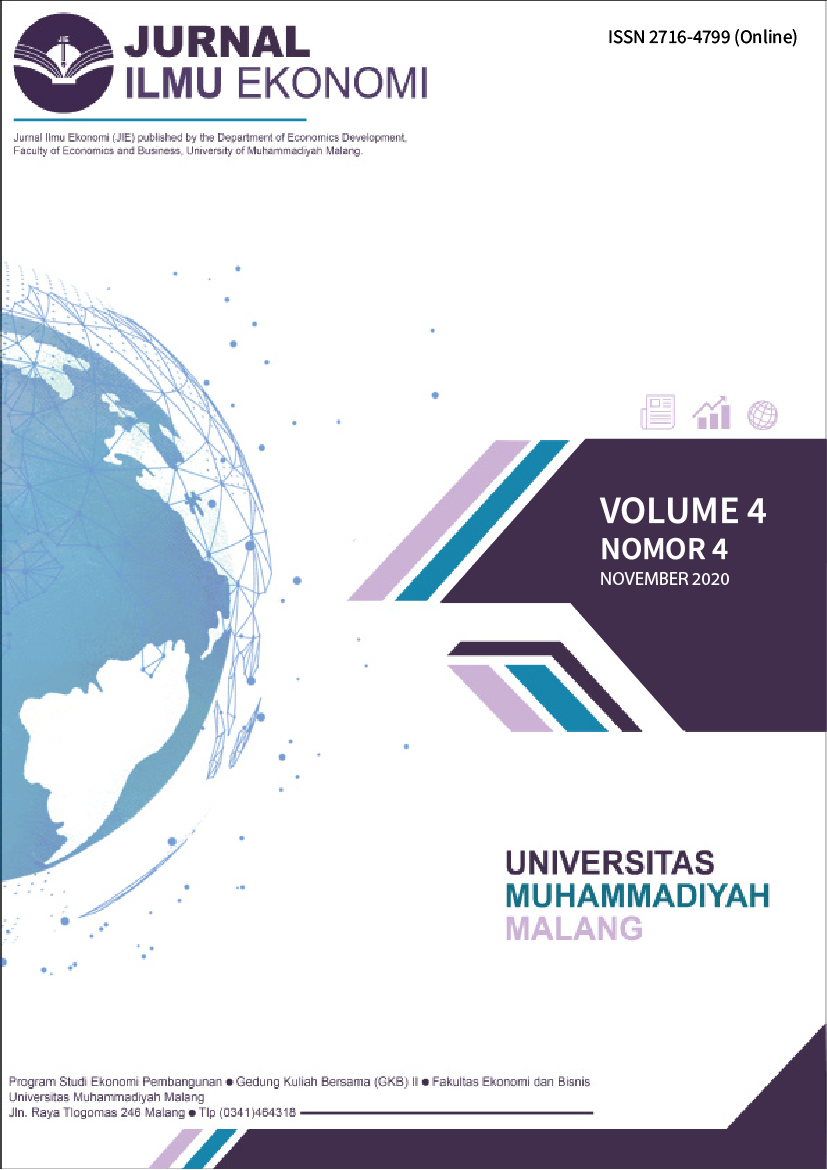PENGARUH GDP DAN NILAI TUKAR NEGARA MITRA DAGANG TERHADAP EKSPOR KARET INDONESIA
DOI:
https://doi.org/10.22219/jie.v4i4.11393Keywords:
Export, Gross Domestic Product, KursAbstract
International trade is one of the economic activities that plays an important role for a country. The benefits of international trade are related to economic growth, national development and national welfare. The condition of limited resources is no longer a barrier to meeting the needs of a country with exchange and trade. Rubber is one of the leading export commodities for the Indonesian plantation sector. Indonesia is one of the main producers of natural rubber number two in the world after Thailand. The purpose of this study was to determine the effect of Gross Domestic Product and the exchange rate of trading partner countries on Indonesian Rubber exports. The type of data used is panel data of Indonesia Rubber export partner countries in 2009-2018. The method used is panel data regression. The results showed that the export of Indonesian Rubber with Gross Domestic Product was positive and significant. And the exchange rate also has a positive and significant effect
Downloads
References
Alinda, N. (2013). Analisis Faktor-Faktor Yang Mempengaruhi Ekspor Karet Di Indonesia. Jurnal Ekonomi Pembangunan, 11(1), 93. https://doi.org/10.22219/jep.v11i1.3733
Anis Suprapti. (2014). Analisis Ekspor Komoditas Pertanian Pangan di Jawa Timur. Ekonomi Pembangunan, 12.
Archibald Damar. (2011). Analisis Faktor-Faktor Yang Mempengaruhi Ekspor Biji Kakao Indonesia ke Malaysia dan Singapura.
Badan Pusat Statistik. (2018). Statistika Karet. https://www.bps.go.id
Bank Indonesia. (2018). Informasi Kurs BI.
Mankiw Gregory. (2007). Makroekonomi (06 ed.). Erlangga.
Sadano Sukirno. (2006). Ekonomi Pembangunan: Proses masalah, dan dasar kebijakan Sadono Sukirno (Edisi ke-2). Kencana Jakarta.
Safriansyah, . (2010). Laju Pertumbuhan Dan Analisa Daya Saing Ekspor Unggulan Di Propinsi Kalimantan Selatan. Jurnal Ekonomi Pembangunan, 8(2), 327. https://doi.org/10.22219/jep.v8i2.3607
Suparman. (2014). Analisis Faktor – Faktor Yang Mempengaruhi Ekspor Karet Indonesia Tahun 1990 – 2012.
Suryanto. (2016). Pengaruh Nilai Tukar, Produk Domestik Bruto dan Produksi Karet Terhadap Ekspor Karet Indonesia. Ilmu Politik Dan Komunikasi, VI No.2.
Ustriaji, F. (2017). Analisis Daya Saing Komoditi Ekspor Unggulan Indonesia Di Pasar Internasional. Jurnal Ekonomi Pembangunan, 14(2), 149. https://doi.org/10.22219/jep.v14i2.3851
World Bank. (2018). Data Gross Domestic Product.
Yudha, A. El, & Hadi, S. (2009). Analisis Pengaruh Tingkat Suku Bunga Sbi Dan Volume Ekspor Impor Terhadap Nilai Tukar Rupiah. Jurnal Ekonomi Pembangunan, 7(1), 47. https://doi.org/10.22219/jep.v7i1.3583
Downloads
Published
How to Cite
Issue
Section
License
Copyright (c) 2020 Jurnal Ilmu Ekonomi JIE

This work is licensed under a Creative Commons Attribution-ShareAlike 4.0 International License.
Authors who publish with this journal agree to the following terms:
- For all articles published in the JIE (Jurnal Ilmu Ekonomi), copyright is retained by the authors. Authors give permission to the publisher to announce the work with conditions. When the manuscript is accepted for publication, the authors agree to the automatic transfer of non-exclusive publishing rights to the publisher.
- Authors retain copyright and grant the journal right of first publication with the work simultaneously licensed under a Creative Commons Attribution-NonCommercial-ShareAlike 4.0 International License that allows others to share the work with an acknowledgement of the work's authorship and initial publication in this journal.
- Authors are able to enter into separate, additional contractual arrangements for the non-exclusive distribution of the journal's published version of the work (e.g., post it to an institutional repository or publish it in a book), with an acknowledgement of its initial publication in this journal.
- Authors are permitted and encouraged to post their work online (e.g., in institutional repositories or on their website) prior to and during the submission process, as it can lead to productive exchanges, as well as earlier and greater citation of published work (See The Effect of Open Access).
This is an open access article and licensed under a Creative Commons Attribution-NonCommercial-ShareAlike 4.0 International License








